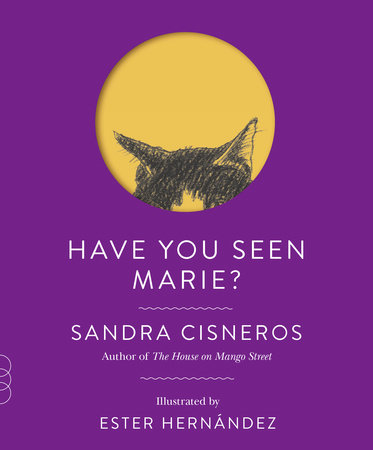Reading Group Center
- Home •
- Books by Category •
- Imprints •
- News •
- Videos •
- Media Center •
- Reading Group Center
Have You Seen Marie?
By Sandra Cisneros
FAMILY ACTIVITIES
— Read the book aloud with your family and show the pictures to younger members of the family who are not yet able to read.
— As a group, write and illustrate a story related to your own loss.
— Plan a small memorial celebration just for your family. Share stories about your loved one—funny, sad, wistful—and do something you enjoyed doing together.
— Gather mementos that remind you of your lost loved one and create a memory box or altar together. Display it in a prominent place in your home.
1. The epigraph is from a poem by Elena Poniatowska: “It’s then I ask you, mama, my mother, my heart, my mother,/my heart, my mother, mama, the sadness I feel. Where do I put it?/Where, mama?” What does this tell us about the story to come?
2. “Every day I woke up and felt like a glove left behind at the bus station,” the narrator says at the beginning of the book. What emotion is she expressing? Have you ever felt that way?
3. Ester Hernández, the illustrator, lost her own mother just before Cisneros approached her to collaborate on the book. Do you think it helped her in her grieving to create this art?
4. How do the illustrations reflect the emotions of the narrator and her friend and show us what they are feeling?
5. In addition to the narrator’s loss of her mother and her friend’s loss of Marie, several other characters in the book have experienced loss. Does it help them to know that others have suffered, too?
6. On page 42, the women encounter a neighbor who is sitting on her porch, knitting. It reminds the narrator of her mother, who “used to knit ugly scarves no one wanted to wear.” Have you ever had a memory triggered by something like that? Why do you think our memories work that way?
7. Throughout the book, people promise to help in some way, but usually forget or become distracted. Why do people make promises they don’t keep? What do you do when someone disappoints you like that?
8. The narrator says she feels like an orphan, though normally we think of orphans as children. In what ways is she an orphan? How would you try to help her feel better?
9. How does searching for Marie help her cope with her loss?
10. Towards the end of the story, the river, the wind, the trees, and the moon all speak to the narrator. How does this help her?
11. The Afterword opens: “In Mexico they say that when someone you love dies, a part of you dies with them. But they forget to mention that a part of them is born in you—not immediately, I’ve learned, but eventually, and gradually.” Does this idea help you to feel better in thinking about people you’ve lost?
12. Later in the Afterword, Cisneros writes, “I wish somebody had told me that love does not die, that we can continue to receive and give love after death.” Do you agree with her? Who has given you love, and to whom have you given it?
13. Cisneros also explains in the Afterword that “There is no getting over death, only learning to travel alongside it.” What does this say about why she wrote this book and how we remember loved ones we have lost?


